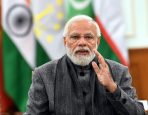
What’s taking the biggest toll on our mental health? Disconnection, financial stress and long waits for care
PTI, Jun 7, 2022, 10:11 AM IST

The new Labour government arrives at a time of mounting mental health strain: Australians have endured COVID, extreme weather events and financial stress from increased living costs.
The new government has a lot to fix in the mental health system but policy priorities should be guided by the voices of Australians.
To learn more about the nation’s priority mental health concerns, our new research surveyed more than 1,000 adults aged 18 to 85 across the nation.
Without being prompted, participants consistently highlighted three major issues: the mental health service system, financial stress, and social disconnection.
A strained mental health system The COVID pandemic added pressure to an already strained mental health-care system. Countless Australians – many experiencing mental ill-health for the first time – were left without appropriate support.
Participants described overwhelming barriers to accessing treatment, including high costs, wait-lists and inaccessibility: The out of pocket expense makes receiving regular, effective psychological treatment prohibitive, especially as a single parent.
– female, late 30s, NSW When people are in crisis, they need the help at that time. Not six months down the track when an opening finally becomes available at the counselling centre.
– non-binary person, early 70s, Tasmania Financial stress Respondents shared how the pandemic “pressurised” other mental health triggers, like financial stress, as JobKeeper and the Coronavirus Supplement were wound back and cost of living increased.
An NSW woman in her late-20s living with a disability shared that prior to receiving the Coronavirus Supplement: “I felt it would be better to kill myself than try and make it work”, but with the supplement, “For the first time in years money wasn’t so tight.” The removal of the supplement was described by another as: crushing and damaging to your mental health – female, late 20s, Tasmania The low payment amount after the supplement was removed was not seen as “sufficient income to live a ‘reasonable life’”.
Together, the stress of low incomes and the return of demanding mutual obligation requirements for JobSeeker (the often-unrealistic set of job-related tasks which recipients must undertake to keep receiving payments) worsened some peoples’ mental health, making recovery difficult.
The social welfare system isn’t equipped to support those of us who struggle to work because of mental health issues. I cry every day at my full-time job and would like to focus on recovery, but the tiny rate of Centrelink payments means I keep struggling through – female, early 30s, Victoria With increasing living costs, a NSW man in his late 20s reported “stressing about having money to make ends meet […] the cost of food going up, and not having money to heat my home in winter”. He described making difficult financial decisions like choosing to “not eat” in favour of “making sure my dog is fed”.
Many spoke of financial stress in relation to housing as a key priority for their mental health, particularly “unaffordable housing prices” (female, early 30s, NSW) and “prohibitive rent” (female, late 60s, Victoria).
Social disconnection Many described a lack of social and community connection as a mental health priority, perhaps unsurprising with COVID lockdowns and strict border controls.
Some felt this was linked to a lack of physical spaces for socialising: We need facilities for people and communities to socialise in a healthy environment. Get rid of the poker machines and make pubs a place where people can openly socialise again – male, late 40s, NSW Others sensed a broader cultural shift away from valuing community: We need supportive communities […] We are too ‘private’ don’t share our troubles, don’t ask for help – female, late 40s, NSW [S]ociety has become very individually focused and less about support – male, late 40s, Victoria.
Building resilience
The voices of diverse Australians included in our study provide clear guidance for the government to build a more resilient and mentally healthy future.
Labor’s election promise to re-instate the telepsychiatry Medicare item in regional and rural areas is important, but the government must address other pressing service issues, including long wait-times and high costs.
The government also needs to address the causes of mental ill-health, such as financial insecurity and social disconnection.
While Labour has promised to tackle job security and housing affordability, it didn’t back an increase to income support benefits. This should be revisited.
In 2021, Labour committed to addressing loneliness and social isolation, although no related election promises were made. Doing so would require changes outside the “health” portfolio. We need a whole-of-government social and emotional well-being lens on all federal policies.
Finally, our study highlighted that drivers of poor mental health are further strained in disaster settings, such as pandemics or extreme weather events. As the Labour government develops its disaster readiness plan, mental health impacts – in addition to economic and infrastructure impacts – must be a key consideration.
(By Marlee Bower, Maree Teesson and Scarlett Smout, University of Sydney. The Conversation)
Udayavani is now on Telegram. Click here to join our channel and stay updated with the latest news.
Top News
Related Articles More

Surgical options for Parkinson’s disease

Breast cancer to cause a million deaths a year by 2040: Lancet commission

Will to resist temptations, achieve goals more trustworthy than using apps, study finds

Govt directs e-commerce firms to remove drinks, beverages from ‘health drinks’ category

Experiencing abuse, neglect as child linked to lifelong ill-health: Study
MUST WATCH
Latest Additions

Russia initiates withdrawal of peacekeeping forces from Karabakh as Azerbaijan takes full control of the region

Dubai flights disrupted as severe weather forces Air India and IndiGo to cancel services

Mumbai Police file FIR against unidentified person for sharing deepfake video of Aamir Khan

BJP’s Udupi candidate receives strong backing from star campaigners

PM Modi sends personalised letters to NDA candidates ahead of first phase of LS polls





















